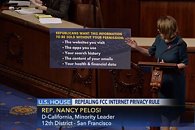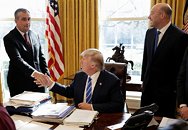Trump to Overhaul "AI Diffusion" Framework with Bilateral Licensing and Tougher GPU Export Controls
The Trump administration is preparing to roll back significant portions of the Biden-era rules that govern global chip exports and AI technology transfers. According to Bloomberg's sources familiar with the matter, the so-called "AI diffusion" framework, due to take effect on May 15, will be scrapped in favor of simpler, bilateral licensing agreements. Under the current plan, rather than sorting about 120 countries into three tiers with differing volume caps, the US will negotiate individual contracts with partners like the United Arab Emirates and Saudi Arabia. Even with these changes, restrictions on China's access to advanced chips will stay firmly in place, and may even be reinforced. The proposed regulations are expected to maintain the outright ban on shipments to China, Russia, Iran, and North Korea, while adding stricter oversight for nations that have previously rerouted US-origin semiconductors toward Beijing's AI and military programs. US officials are also considering lowering the notification threshold for smaller shipments, from 1,700 NVIDIA H100 equivalent units down to around 500, to close loopholes used by alleged smuggling networks.
Industry reaction has been mixed but largely positive. Chipmakers saw their share prices climb when news of the repeal broke, citing hopes for clearer rules and fewer compliance headaches. Governments in Southeast Asia and Eastern Europe are watching closely and urging Washington to provide detailed guidance during the transition to avoid market disruptions. The AI diffusion rule was introduced in January 2025 with the goal of drawing countries such as India, Malaysia, and Poland into a more stringent export regime. Critics have argued that its complex, tiered system stifled innovation and diplomatic flexibility. The incoming framework will instead rely on targeted, outcome-driven accords that tie access to strategic investments and broader trade incentives. An official announcement could come as soon as Thursday, just before President Trump's trip to the Middle East. Final details are expected to be released in the coming weeks, marking a new chapter in US semiconductor diplomacy.
Industry reaction has been mixed but largely positive. Chipmakers saw their share prices climb when news of the repeal broke, citing hopes for clearer rules and fewer compliance headaches. Governments in Southeast Asia and Eastern Europe are watching closely and urging Washington to provide detailed guidance during the transition to avoid market disruptions. The AI diffusion rule was introduced in January 2025 with the goal of drawing countries such as India, Malaysia, and Poland into a more stringent export regime. Critics have argued that its complex, tiered system stifled innovation and diplomatic flexibility. The incoming framework will instead rely on targeted, outcome-driven accords that tie access to strategic investments and broader trade incentives. An official announcement could come as soon as Thursday, just before President Trump's trip to the Middle East. Final details are expected to be released in the coming weeks, marking a new chapter in US semiconductor diplomacy.












